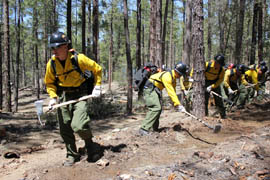Cronkite News has moved to a new home at cronkitenews.azpbs.org. Use this site to search archives from 2011 to May 2015. You can search the new site for current stories.
Seasonal wildfire crews eligible for federal health benefits under new rule
WASHINGTON – Seasonal hotshot firefighters will be able to buy into the Federal Employees Health Benefits program, the same program that offers health insurance to federal full-time employees, the White House announced Tuesday.
Until now, the firefighters were not allowed to get government health insurance because they were classified as temporary employees. The new proposal took effect immediately.
“Starting today, the brave men and women of our nation’s federal firefighting forces, as well as their families, will have access to the health coverage they deserve,” President Barack Obama said in a prepared statement. Published reports said the president first suggested the program while meeting with wildland firefighters in Colorado last week.
Paul Delmerico, superintendent of the Carson Interagency Hotshot Crew in Carson National Forest in New Mexico, said he welcomes the announcement and the impact it will have on some of his crew.
“These folks put a lot of blood, sweat and tears into what they do and they need to be compensated,” said Delmerico, whose crew can include as many as 11 to 13 seasonal firefighters. “And with this health insurance, it’s part of showing that we care.”
The Office of Personnel Management oversees the Federal Employees Health Benefits program, and said in a written statement that fire personnel will be able to buy into the system during fire season. They will have the option of extending coverage at their own expense once the season ends.
Extending benefits to seasonal crews is estimated to cost $20 million a year and affect more than 6,000 firefighters at the departments of Interior and Agriculture, said Jim Brownlee, an Agriculture Department spokesman. The benefits will be funded out of the existing U.S. Forest Service budget, he said.
An OPM spokesman said that firefighters will have a “broad range” of health benefits options to choose from.
But Daniel Patterson, ecologist and Southwest director of Public Employees for Environmental Responsibility, wondered just how affordable the options will be.
“Seasonal firefighters don’t make much money,” Patterson said. “It would be a positive impact on the quality of life for wildland firefighters – if it’s affordable.”
Delmerico said that’s one of many questions that still need to be answered.
“We don’t know how our agencies are going to administer it,” he said. “We still have to figure out how that’s going to look.”
Patterson said the job fire crews do is “hazardous” and that providing the option for health insurance “is the right thing to do.”
“You inhale a lot of smoke and there’s a lot of wear and tear on your body, hiking up steep, rough terrain with a lot of gear,” Patterson said. “You can have injuries like ankles, knees and then … all the way up to severe burns and even lung damage from inhaling lots of smoke.”
He also said that until healthy forests can be restored, there will be an increased need for firefighters during wildfire season.
“Fire is a natural part of our forests and we need good, dedicated wildland firefighters to manage the forests,” Patterson said. Taking care of the firefighters is “going to help us take better care of the forests.”







